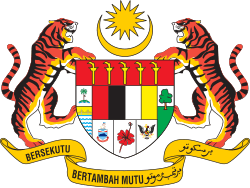United Pasokmomogun Kadazan Organisation
The United Pasokmomogun Kadazan Organisation (Malay: Pertubuhan Kebangsaan Kadazan Bersatu; abbrev: UPKO) was a Kadazan-Dusun-Murut (KDM) based political party in North Borneo and later Sabah at the time it became a state of Malaysia in the 1960s.[1][2]
United Pasokmomogun Kadazan Organisation Pertubuhan Kebangsaan Kadazan Bersatu | |
|---|---|
.jpg) | |
| Abbreviation | UPKO |
| Leader | Fuad Stephens |
| Founder | Fuad Stephens |
| Founded | June 1964 |
| Dissolved | 28 December 1967 |
| Merger of | Reunite of United Pasok Momogun Organisation (UPMO) to form United Pasokmomogun Kadazan Organisation (UPKO) - 1964 |
| Split from | Breakaway of United Pasok Momogun Organisation (UPMO) - 1962 |
| Preceded by | Formation of United National Kadazan Organisation (UNKO) - 1961 |
| Succeeded by | Consolidation into United Sabah National Organisation (USNO) - 1967 |
 |
|---|
| This article is part of a series on the politics and government of Malaysia |
|
|
|
History
Formation of United National Kadazan Organisation (1961)
The party was initially started as the United National Kadazan Organisation (UNKO) which was founded by Donald Stephens in 1961, with its core constituency of indigenous Sabahans.[3] UNKO modeled after United Malays National Organisation (UMNO) in Malaya; was the first indigenous party in Sabah formed to represent the interests of the Kadazandusun community in Sabah. At the time of its founding it had approximately 20,000 members.[4]
Breakaway of United Pasok Momogun Organisation (1962)
The new party UNKO somehow split with a group led by G. S. Sundang going on to form the United Pasok Momogun Organisation (UPMO) in January 1962.[3]
Reunification and formation of United Pasokmomogun Kadazan Organisation (1963-1964)
Upon the formation of Malaysia in 1963, UNKO entered into a Sabah Alliance coalition with the United Sabah National Organisation (USNO), a Muslim party, and the Sabah Chinese Association (SCA) to form a consociationalism new Government of Sabah[3]; with its president Stephens became the state's first Chief Minister.[4] In May 1964, the breakaway UPMO party, eventually reunited with its parent party.[1] The merger saw UNKO renamed itself as the United Pasokmomogun Kadazan Organisation (UPKO) in June 1964.[2]
Dissolution and merger into United Sabah National Organisation (1967)
After Stephens was forced out of the chief ministership in 1964 and became a federal minister.[5], the party was dissolved on 28 December 1967 and absorbed into United Sabah National Organisation (USNO).[2][6]
See also
- Politics of Malaysia
- List of political parties in Malaysia
- Sabah Democratic Party (PDS)
- United Pasokmomogun Kadazandusun Murut Organisation (UPKO) (New)
References
- "UPKO rebranded to United Progressive People of Kinabalu Organisation". Bernama. Malaysiakini. 23 November 2019. Retrieved 26 November 2019.
- "United Pasokmomogun Kadazandusun Murut Organisation / Parti Demokratik Sabah". Retrieved 28 November 2019.
- Sabah State Archives. "GOVERNMENTAL RECORDS (Before Independence)". Chief Minister Department. Retrieved 9 April 2016.
- Lim, Regina (2008). Federal-state Relations in Sabah, Malaysia: The Berjaya Administration, 1976-85. Institute of Southeast Asian Studies. p. 42.
- Luping, Herman (14 September 2013). "Sabah foresees a brighter future". New Straits Times. Retrieved 6 November 2014.
- "Former federal minister celebrates 80th birthday in style". Borneo Post. 19 June 2012. Retrieved 6 November 2014.